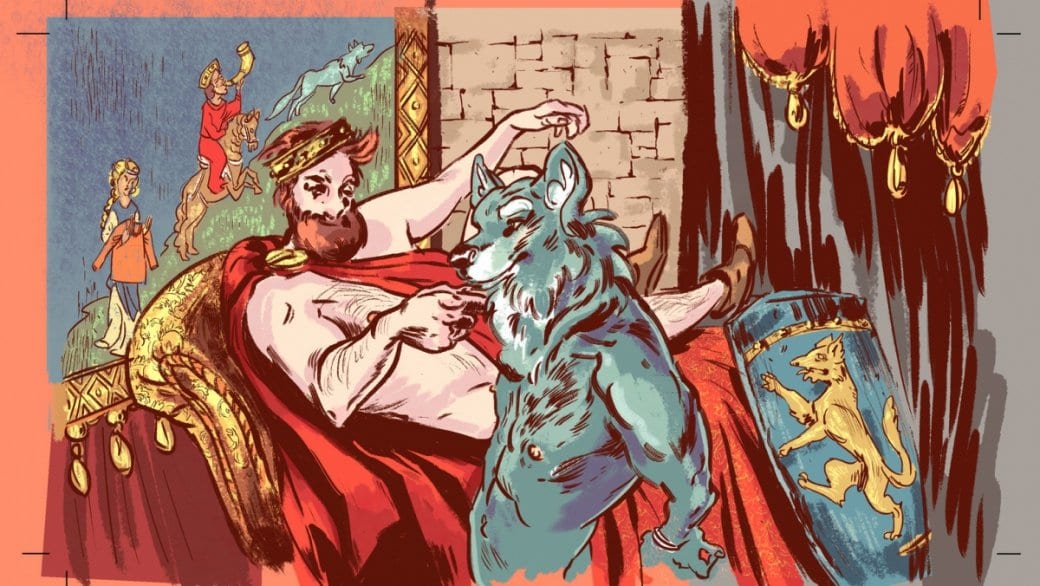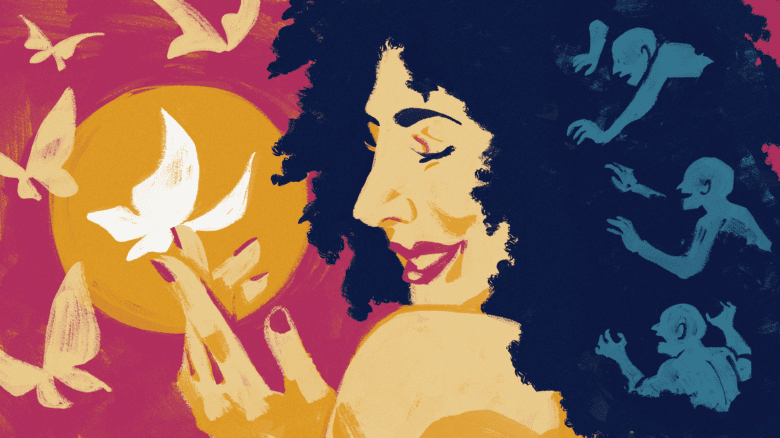As far as I can tell, Marie de France wrote the first gay werewolf story in history. Little is known about the 12th century, Normandy-born English writer, but she did pen a series of 12 short romantic lais, Anglo-Norman romance tales with fantastical elements. Among stories about cheating kings, horny knights, slutty beauties, polygamist noblewomen, sex and murder is the tale of Bisclavret, the lycanthropic love of the king.
The lais starts with a happily married Breton knight. He and his wife love each other, but she worries when he disappears into the woods for days at a time, returning “happy and gay.” What double life does he lead? Does he have another lover?
She prods and pries, and the nobleman fears how she’ll react if he tells her, before he finally relents. The nobleman explains that he is “bisclavret”— the writer compares this term to the Norman lore of the “garwolf,” a savage beast that, “eats men, wreaks havoc, does no good / Living and roaming in the deep wood.”
A man lost to his primal urges, forsaking his wife and disappearing into the woods, you say? The erotic connotations are palpable . . .
No doubt with the Norman lore of the garwolf in mind, the lady is terrified, not even wanting to share his bed. At this point, it’s revealed there is another knight in love with her, and that she’d never thought of him with affection until her husband’s bestial revelation.
She calls for the other knight and they carry out a plot to separate Bisclavret from his clothes, which he hides near an old chapel on the road.
When he doesn’t return to the household, the lady assumes her husband disappeared into the woods for good and she marries her scheming knight, taking over Bisclavret’s estate.
A year on, the king is hunting in the forest where Bisclavret had disappeared when he spots the beast and calls for a chase. Eventually, Bisclavret throws himself at the king’s feet, kissing his foot and leg.
The king is amazed by the beast’s begging for mercy and calls off the hunters. The creature follows the king, who decides to keep it “as a great treasure. He tells his people it’s his pleasure / For them to take the best of care / Of it; let no-one harm it, or dare / To strike it, for love of the King.”
The court is impressed by the beast’s gentle, well-bred nature. “Wherever the King might go / It didn’t want to be separated, so/ It went along with him constantly / That it loved him was easy to see.”
The king’s connection to Bisclavret deepens even further when they return together to Bisclavret’s lost lands. When the betraying wife hears the king is there, she attends to him with an expensive gift, only to have her nose bitten off by the normally gentle Bisclavret. As she is carted off for her indiscretions, she reveals the entire scandal.
The king takes Bisclavret, still in beast mode, to his bedroom to transform back into a man. And when he does, so does their relationship:
On the king’s royal bed, they see
Lying fast asleep, the knight.
The king ran to hug him tight;
He kissed him a hundred times that day.
When he catches his breath, he hands
Him back all his fiefs and lands,
And more presents than I will say.
Essentially, the king and Bisclavret live happily ever after.
You may be thinking I’m reading too much into Marie de France’s allegorical tale — there’s no way a 12th century writer had any intention of a romantic relationship between the king and a werewolf! However, in another of Marie de France’s lais, a jealous queen accuses the protagonist, Lanval, of homosexuality, so it wasn’t out of the scope of the author’s understanding. I wondered if Bisclavret was based on a king, but the closest I could find was 12th century King Richard I of England, Overlord of Brittany, whom historians believe might have been homosexual or bisexual.
Seeking out an expert opinion, I stumbled on the master’s thesis of Caitlin Giacopasi from Seton Hall University, titled, “The Werewolf Pride Movement: A Step Back from Queer Medieval Tradition.”
“Same-sex desire has been cited more than once as the driving force behind ‘Bisclavret,’ in which a king takes the place of his knight’s wife,” Giacopasi writes. “The knight does not reject the replacement.”
Giacopasi also points out that the only harm Bisclavret’s curse causes is to his marriage. Only by escaping into his bestial nature, coming out publicly as a werewolf and ridding himself of his heterosexual marriage can Bisclavret find love and a happy ending.
History Boys appears on Daily Xtra on the first and third Tuesday of every month. You can also follow them on Facebook.


 Why you can trust Xtra
Why you can trust Xtra


